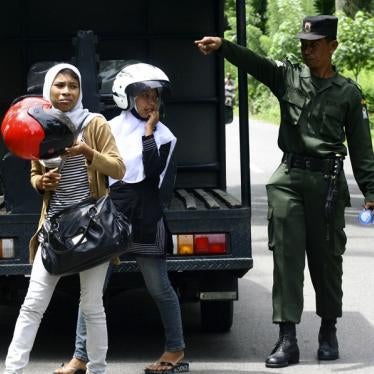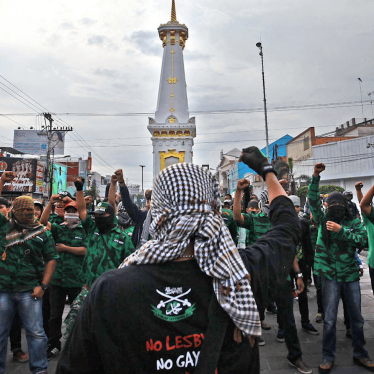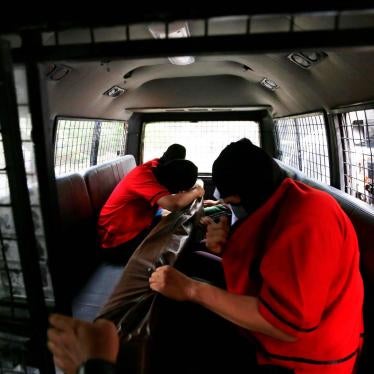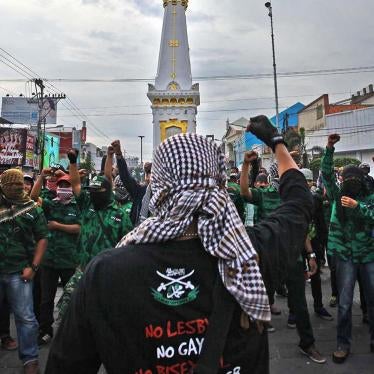(New York, May 5, 2017) – An Indonesian police raid targeting gay men in Surabaya, Indonesia, on April 30, 2017, threatens the rights of the country’s already beleaguered lesbian, gay, bisexual, and transgender (LGBT) community, Human Rights Watch said today. The police ordered 14 men to undergo HIV tests and arrested eight of those men on charges of violating the country’s draconian and discriminatory anti-pornography law.
The police, acting on tip-offs from neighbors, carried out a midnight raid on the 14 men, who had gathered in two rooms of a hotel in central Surabaya, Indonesia’s second largest city, according to local activists and media reports. Police detained the group while confiscating condoms, mobile phones, and a flash drive that allegedly contained pornographic videos, among other items.
On May 1, police informed the media that all 14 men underwent tests for sexually transmitted infection, including a rapid test for HIV, and that five had tested HIV positive. The police indicated that eight of the men were detained on Law on Pornography charges, and that two of them would be charged with organizing the event and providing pornography – offenses carrying prison terms of up to 15 years.
“Indonesian police are again violating the basic rights of LGBT people by invading their privacy,” said Phelim Kine, deputy Asia director at Human Rights Watch. “The Surabaya raid subjected these gay men to traumatic humiliation, puts two at risk of long prison terms, and threatens the privacy rights of all Indonesians.”
Mandatory HIV testing is contrary to the ethical and human rights principles of privacy, autonomy, and informed consent. Under the World Health Organization’s 2015 Guidelines on HIV Testing and Counseling, “Mandatory, compulsory or coercive HIV testing is never appropriate.”
The two men who allegedly organized the party face charges of violating the Law on Pornography, which prohibits sex parties and the use of pornography, and the Electronics Information and Transaction Law, which prohibits making accessible electronic content that contains “indecent” material. Indonesia’s Law on Pornography defines “deviant sexual acts” to include: sex with corpses, sex with animals, oral sex, anal sex, lesbian sex, and male homosexual sex.
The arrests in Surabaya follow an unprecedented anti-LGBT campaign in 2016 that featured a series of biased and false statements about LGBT people from government officials and politicians. The anti-LGBT onslaught led to harassment and violence against LGBT Indonesians and death threats by militant Islamists. Government institutions, including the National Broadcasting Commission and the National Child Protection Commission, issued censorship directives banning information and broadcasts that portrayed the lives of LGBT people as “normal,” as well as so-called “propaganda” about LGBT lives.
Despite President Joko “Jokowi” Widodo’s rhetorical support for the basic human rights of Indonesia’s LGBT community, the authorities target the vulnerable minority with impunity, Human Rights Watch said. In April, authorities in Aceh province arrested two men for allegedly having consensual sex in the privacy of their home. The men face a public flogging sentence – which violates international legal prohibitions against torture – under the province’s Sharia (Islamic law) ordinances.
Privacy rights are a fundamental protection that underlie everyone’s physical autonomy and identity, Human Rights Watch said. The United Nations Human Rights Committee, the independent body of experts that interprets the International Covenant on Civil and Political Rights (ICCPR), to which Indonesia is party, has stated: “it is undisputed that adult consensual sexual activity in private is covered by the concept of ‘privacy.’”
In 2013 Indonesia co-sponsored a UN Human Rights Council resolution on the right to privacy. In the report on that resolution, the UN High Commissioner for Human Rights reminded governments that privacy rights (enshrined in ICCPR article 17) should be upheld jointly with the right to nondiscrimination (ICCPR article 26).
“So long as the government permits police raids on private gatherings under a discriminatory law, it will fail to curb anti-LGBT harassment and intimidation.” Kine said. “President Jokowi should make good on his commitments to protect privacy rights and put an end to state-sanctioned discrimination.”









